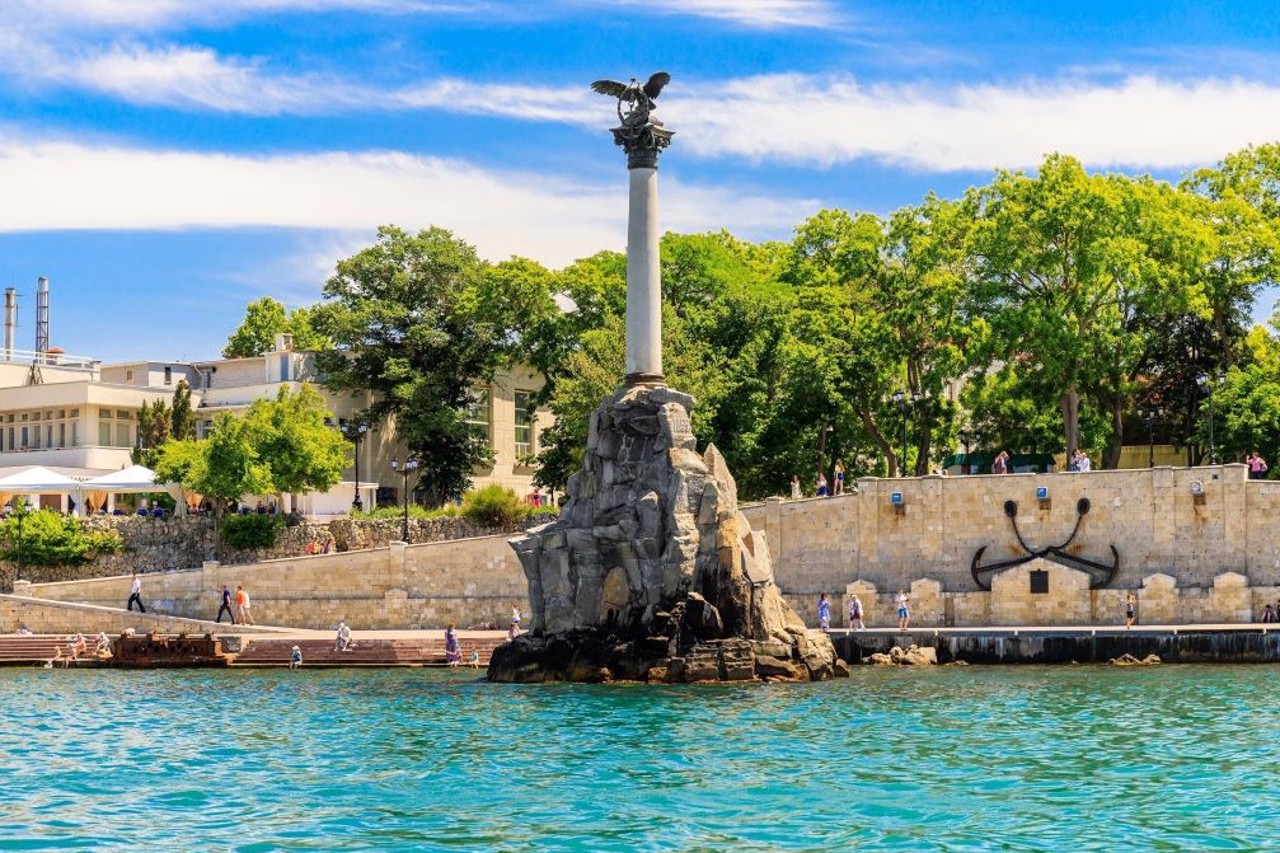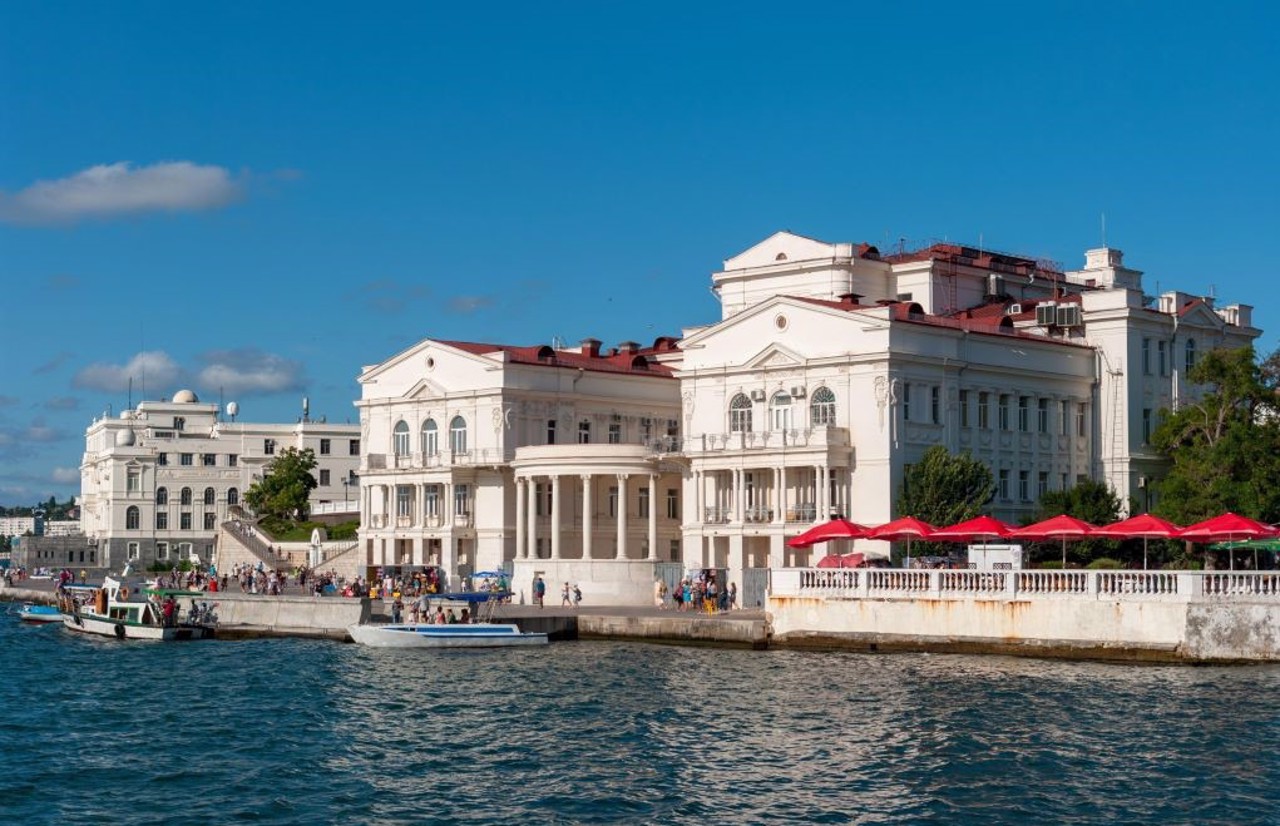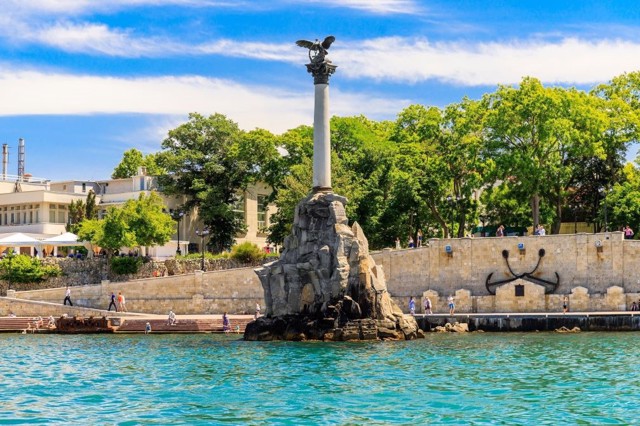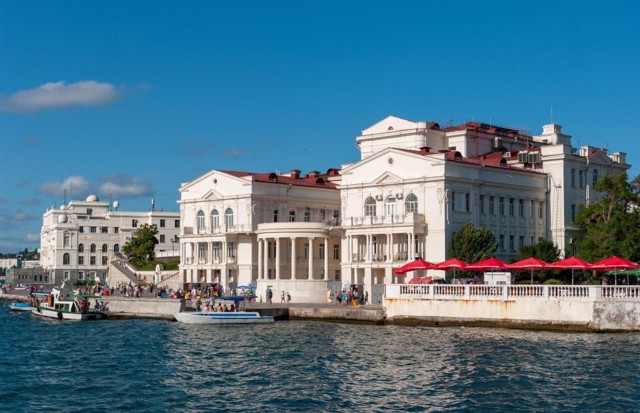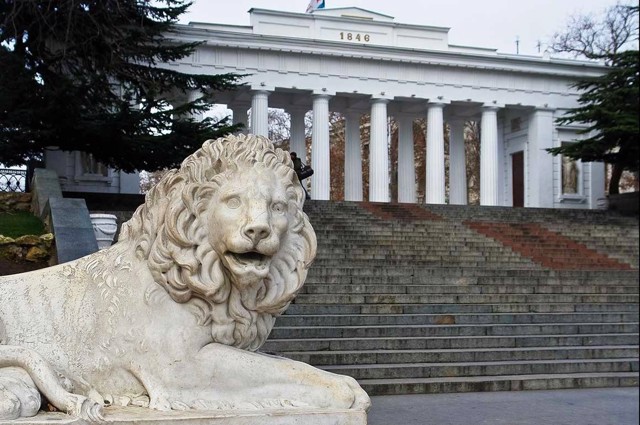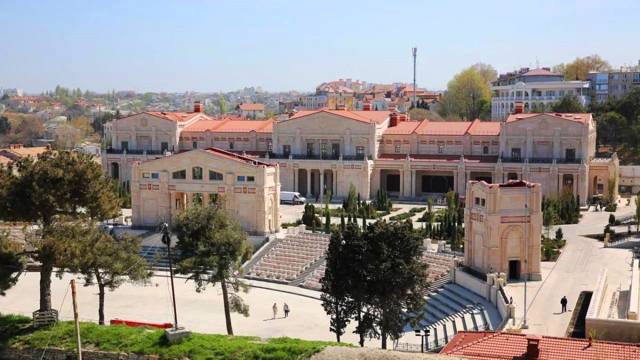Functional temporarily unavailable
General information about Sevastopol
Sevastopol - a city of maritime glory, a historical monument and a resort. Independent administrative-territorial unit within Ukraine. Modern Sevastopol was founded as a naval fortress near the village of Akhtiar by Rear Admiral Thomas Mackenzie on the recommendation of Alexander Suvorov in 1783, after the annexation of Crimea to the Russian Empire.
However, earlier in its place there was a Greek city of Chersonesos Tavria, founded in 422-421 BC by colonists from Heraclea. It was a democratic city-state, then an aristocratic republic dependent on Rome. For centuries it remained the cultural and commercial center of the entire southwestern Crimea. In the III-V centuries it gradually became dependent on Byzantium. In the V century he converted to Christianity (the first Christian co ...
Sevastopol - a city of maritime glory, a historical monument and a resort. Independent administrative-territorial unit within Ukraine. Modern Sevastopol was founded as a naval fortress near the village of Akhtiar by Rear Admiral Thomas Mackenzie on the recommendation of Alexander Suvorov in 1783, after the annexation of Crimea to the Russian Empire.
However, earlier in its place there was a Greek city of Chersonesos Tavria, founded in 422-421 BC by colonists from Heraclea. It was a democratic city-state, then an aristocratic republic dependent on Rome. For centuries it remained the cultural and commercial center of the entire southwestern Crimea. In the III-V centuries it gradually became dependent on Byzantium. In the V century he converted to Christianity (the first Christian community was founded by Andrew the First-Called in the I century). During the times of Kievan Rus it was known as Korsun, here the Kyivan prince Volodymyr the Great converted to Christianity.
It experienced an economic boom until the 13th century, when the city, weakened by the Genoese, was destroyed by the Tatar hordes. The new rise of the city began in the XVIII century, after Russia's victory in the war with Turkey, when the Russian fleet needed a base on the Black Sea. Founded by order of Empress Catherine II, the fortress received the Greek name Sevastopol ("majestic city", "city of glory"). During the Crimean War of 1854-55, after a 349-day siege (First Defense), the city fell under pressure from the combined forces of England, France and Turkey. The second defense lasted 250 days during World War II in 1941 - after four assaults, the destroyed city was handed over to the Nazis.
In 1957 Sevastopol was rebuilt almost anew. As a naval base of the Black Sea Fleet of the USSR Navy, Sevastopol was a closed city. After the annexation of Crimea to Ukraine in 1954, Sevastopol became a city of republican subordination to the Ukrainian SSR and was subordinated to Kyiv. Now it is becoming a popular resort with a well-developed tourist infrastructure.
Sevastopol City Day is celebrated on the second Saturday after June 2.
Севастополь - місто морської слави, пам'ятник історії і курорт. Самостійна адміністративно-територіальна одиниця в складі України. Сучасний Севастополь заснований як морська фортеця поблизу селища Ахтіар контр-адміралом Фомою Макензі за рекомендацією Олександра Суворова в 1783 році, після приєднання Криму до Російської імперії.
Однак раніше на його місці існував грецький поліс Херсонес Таврійський, заснований у 422-421 роках до нашої ери колоністами з Гераклеї. Був демократичним містом-державою, потім аристократичної республікою, залежною від Риму. Протягом століть залишався культурним і торговим центром всього південно-західного Криму. У III-V столітях поступово потрапляє в залежність від Візантії. У V столітті приймає християнство (першу християнську громаду заснував Андрій ...
Севастополь - місто морської слави, пам'ятник історії і курорт. Самостійна адміністративно-територіальна одиниця в складі України. Сучасний Севастополь заснований як морська фортеця поблизу селища Ахтіар контр-адміралом Фомою Макензі за рекомендацією Олександра Суворова в 1783 році, після приєднання Криму до Російської імперії.
Однак раніше на його місці існував грецький поліс Херсонес Таврійський, заснований у 422-421 роках до нашої ери колоністами з Гераклеї. Був демократичним містом-державою, потім аристократичної республікою, залежною від Риму. Протягом століть залишався культурним і торговим центром всього південно-західного Криму. У III-V столітях поступово потрапляє в залежність від Візантії. У V столітті приймає християнство (першу християнську громаду заснував Андрій Первозванний ще в I сторіччі). За часів Київської Русі відомий як Корсунь, тут прийняв християнство київський князь Володимир Великий.
До XIII століття переживає економічний підйом, поки ослаблене генуезцями місто не знищили татарські орди. Новий підйом міста почався в XVIII столітті, після перемоги Росії у війні з Туреччиною, коли російському флоту знадобилася база на Чорному морі. Закладена за наказом імператриці Катерини II фортеця отримала грецьку назву Севастопль ( "величне місто", "місто слави"). Під час Кримської війни 1854-55 років, після 349-денної облоги (Перша оборона), місто пало під натиском об'єднаних сил Англії, Франції та Туреччини. Друга оборона тривала 250 днів під час Другої Світової війни в 1941 році - після чотирьох штурмів зруйноване місто було здано гітлерівцям.
У 1957 році Севастополь був відбудований практично наново. Як військово-морська база Чорноморського флоту ВМФ СРСР, Севастополь був закритим містом. Після приєднання Криму до України в 1954 році Севастополь став містом республіканського підпорядкування УРСР і був підпорядкований Києву. Зараз перетворюється на популярний курорт з добре розвиненою туристичною інфраструктурою.
День міста Севастополя відзначають у другу суботу після 2 червня.
Сплануй своє перебування у Sevastopol
What to see and where to go in Sevastopol
Tourist attractions and museums of Sevastopol
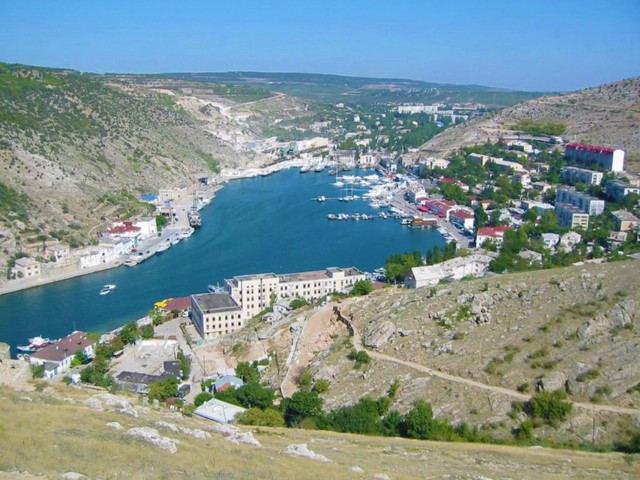
Balaklava Bay
Historic area , Natural object
The picturesque Balaklava Bay is located on the southeastern outskirts of Sevastopol, officially part of the city. Until 1957, Balaklava was a separate settlement.
Known since the 8th century BC as a Taurian settlement. It was first mentioned by Homer as Lamos, the city of the Listryhons. In the 1st century, Roman troops displaced the Taurians and Scythians, and the Greek village of Yambol appeared in the bay. In the 14th century, the Genoese, who captured the coast, built the Chembalo Fortress on the top of Mount Kastron, which dominates the entrance to the bay (the towers and parts of the fortress wall have survived). In 1475, Balaklava Bay was captured by the Turks, who renamed it Balak-Yuve (in Turkish - "fish bag").
After the Crimean War, Balaklava became a remote town, then a small bohemian resort (Lesya Ukrayinka rested here).
In Soviet times, a unique underground submarine repair plant was built in Balaklava Bay. After Ukraine gained Independence, a private Naval Museum Complex "Balaklava" was opened on its basis. Nearby is the underground "Object-221" - an unfinished reserve command post of the Black Sea Fleet.
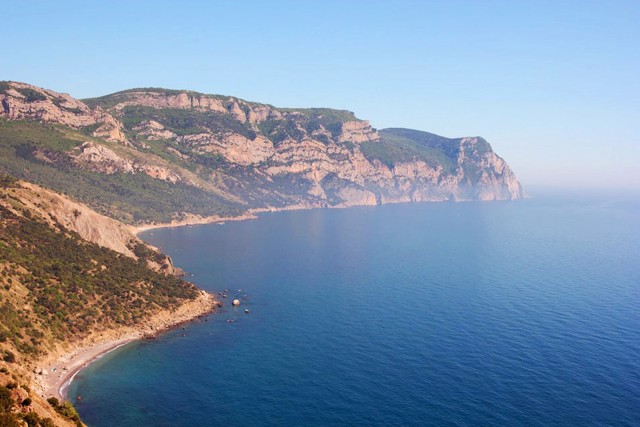
Cape Aya
Natural object
Cape Aya on the southern coast of Crimea is considered the conditional western border of the SCC.
It is a steep spur of the Main Ridge of the Crimean Mountains (the highest point of the cape is Mount Kokiya-Kala, 558 meters).
The state landscape reserve "Cape Aya" combines such natural attractions as the Batylyman tract, groves of Pizunda pine, tall juniper and Stankevych pine, as well as a coastal aqua complex near Cape Aya.
At the foot of the cape there are caves and the beach "Lost World", which can be reached from Balaklava only by sea.
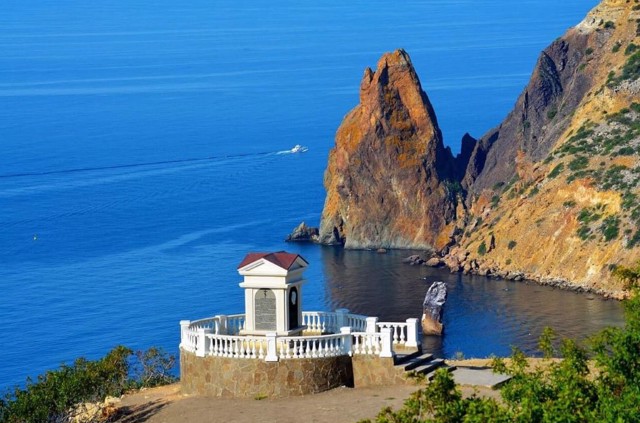
Cape Fiolent
Historic area , Natural object
Fiolent is a resort area on a picturesque cape in the Balaklava district of Sevastopol. The rocks are composed of rocks of volcanic origin. The ancient name of Cape Parthenium (Cape Virgo) is associated with the ancient Greek myth of Iphigenia, which was brought here by Artemis to become a priestess in the temple of the Virgin.
According to legend, the Apostle Andrew the First-Called set foot on Crimean soil here. According to another legend, in 890, during a storm, an image of George the Victorious appeared on a rock to three Greek sailors, in whose honor the rescued built a basilica and founded Saint George's Monastery.
The area attracts vacationers with Jasper Beach, developing tourist infrastructure, becoming an independent village.
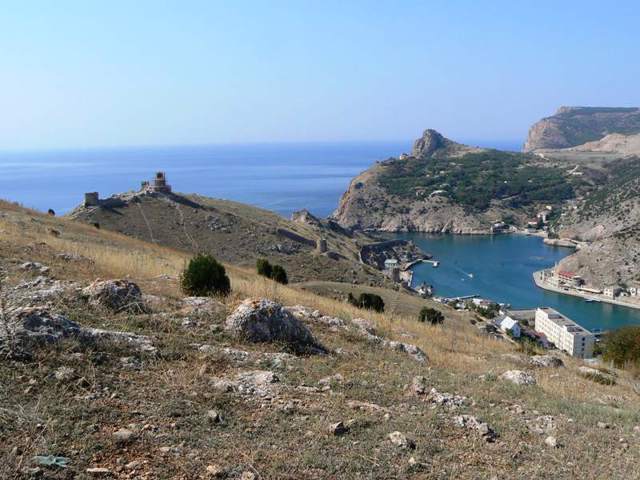
Chembalo Fortress
Castle / fortress
Fortifications on Mount Kastron above the entrance to Balaklava Bay were built in the 14th century the Genoese who settled here.
On the mountain was the administrative part of the Chembalo fortress - the City of Saint Nicholas (Upper City or Citadel), below was the City of Saint George surrounded by three lines of walls (Lower or Outer City), where ordinary townspeople lived.
In 1475, the city was captured by the Turks, who renamed it Balak-Yuva. They remained the masters of Balaklava for three centuries before the conquest of Crimea by Russia. During the Crimean War, the British garrison was stationed here.
To our time, the Chembalo fortress has survived in ruins, but the silhouette of its towers on the slopes of the fortress has become a business card of Balaklava. Restoration work is underway, and the creation of a museum is planned. Visiting is free.
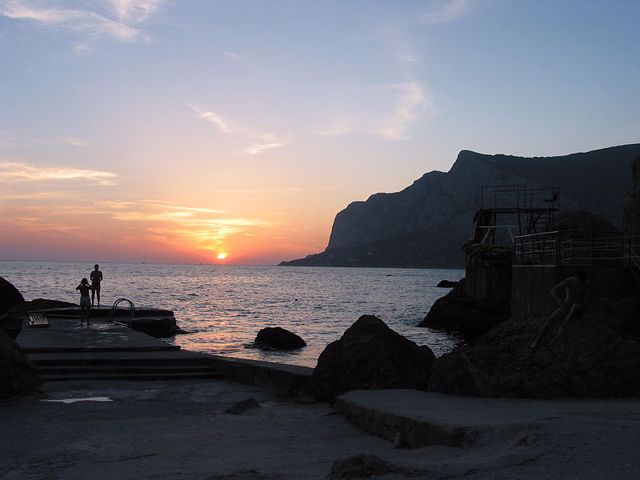
Laspi Bay
Natural object
Laspi Bay is one of the resort and health zones of Sevastopol in the bay between capes Aya and Sarych, 12 kilometers from Foros. The name is translated from Greek as mud (in ancient times the tract was very wet from a large number of springs). The village of Laspi existed at the beginning of the 20th century on a hill 2.5 kilometers northeast of Cape Laspi.
Now on the coast there are boarding houses and recreation centers, tent camps of "savages". From the observation deck in the area of the Laspi pass on the Sevastopol-Yalta highway, a beautiful view of Laspi Bay opens, a memorial plaque has been installed in honor of the builders of the new road.
Sevastopol on photo and video
Sevastopol in news and blogs
Reviews Sevastopol
Geographical information about Sevastopol
| {{itemKey}} | {{itemValue}} |
|---|
